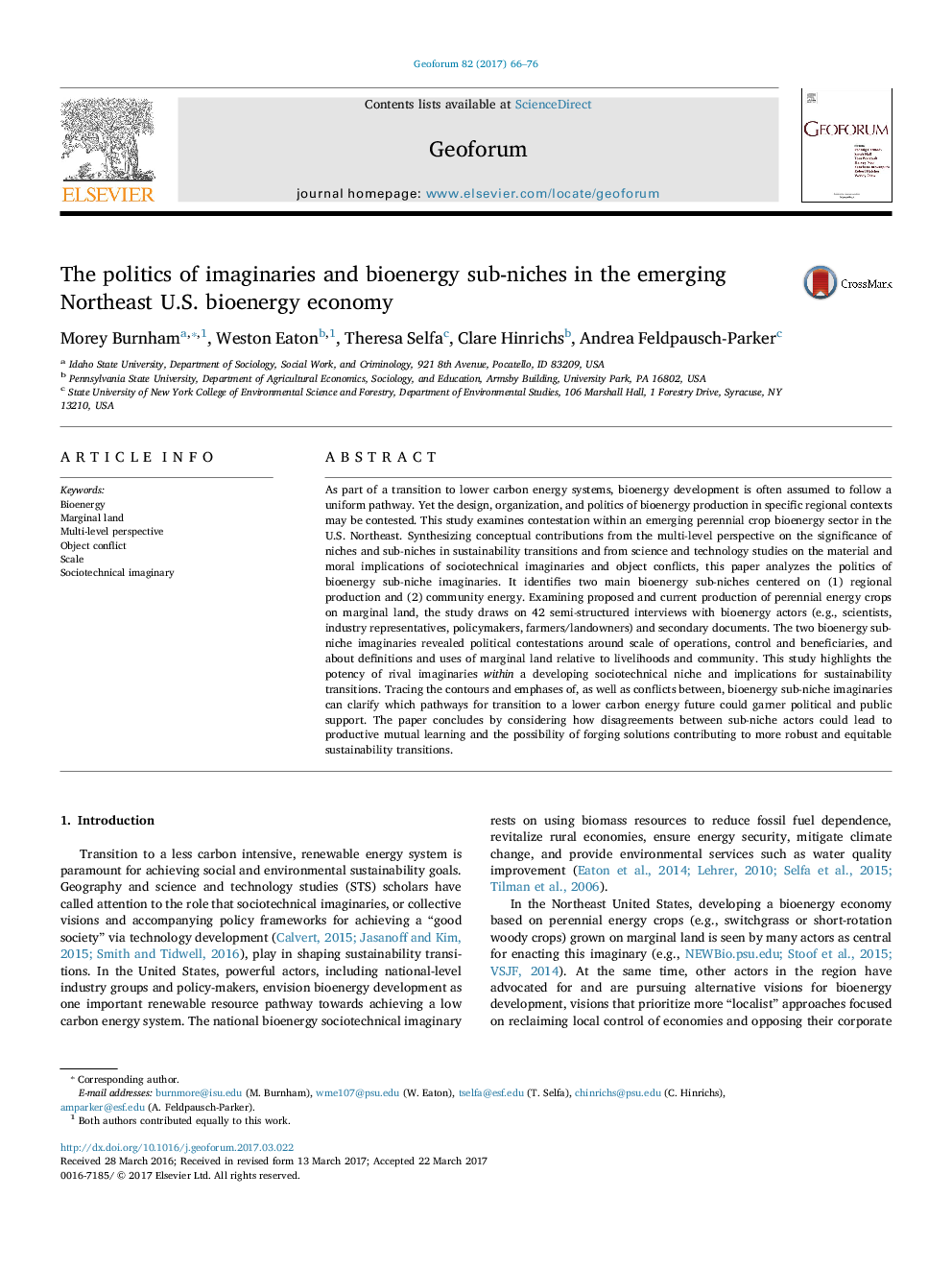ترجمه فارسی عنوان مقاله
سیاست زیست شناسی و زیرمجموعه های زیست انرژی در اقتصادهای نوظهور زیست محیطی شمال شرق ایالات متحده
عنوان انگلیسی
The politics of imaginaries and bioenergy sub-niches in the emerging Northeast U.S. bioenergy economy
| کد مقاله | سال انتشار | تعداد صفحات مقاله انگلیسی |
|---|---|---|
| 86399 | 2017 | 11 صفحه PDF |
منبع

Publisher : Elsevier - Science Direct (الزویر - ساینس دایرکت)
Journal : Geoforum, Volume 82, June 2017, Pages 66-76
ترجمه کلمات کلیدی
بیو انرژی، سرزمین حاشیه، چشم انداز چند مرحله ای، مناقصه هدف، مقیاس، سوادآموزی خیالی،
کلمات کلیدی انگلیسی
Bioenergy; Marginal land; Multi-level perspective; Object conflict; Scale; Sociotechnical imaginary;
ترجمه چکیده
به عنوان بخشی از انتقال به سیستم های انرژی کم انرژی کربن، توسعه انرژی زیستی اغلب به دنبال مسیر یکنواخت است. با این وجود، طراحی، سازماندهی و سیاست تولید انرژی زیستی در حوزه های خاص منطقه ای ممکن است مورد تردید قرار گیرد. در این مطالعه، رقابت در بخش زیست محیطی محصولات زراعی چند ساله در شمال شرقی ایالات متحده مورد بررسی قرار می گیرد. سنتز کردن مشارکت مفهومی از چشم انداز چند سطحی در مورد اهمیت نیش ها و نواحی زیر در گذار پایداری و از مطالعات علمی و فناوری در مورد پیامدهای مادی و اخلاقی تخیلیات اجتماعی و درگیری های جسم، در این مقاله سیاست های زیست محیطی تصورات این دو زیرمجموعه اصلی انرژی زیستی را که بر اساس (1) تولید منطقه ای و (2) انرژی اجتماعی محسوب می شود شناسایی می کند. در این تحقیق 42 مصاحبه نیمه ساختار یافته با بازیگران فعال زیست محیطی (مثلا دانشمندان، نمایندگان صنایع، سیاستگذاران، کشاورزان و مالکان زمین) و اسناد ثانویه مورد بررسی قرار گرفته و تولید فعلی محصولات انرژی چند ساله در زمین های حاشیه ای انجام می شود. دو تصورات زیرزمینی انرژی زیست محیطی، رقابت های سیاسی را در مقیاس عملیات، کنترل و سودمند، و در مورد تعاریف و استفاده از زمین های حاشیه ای نسبت به معیشت و جامعه، نشان داد. این تحقیق توانایی رانندگان رقیب را در یک در حال توسعه رویکرد اجتماعی تدریجی و پیامدهای انتقال گذار پایداری نشان می دهد. ردیابی خطوط و تأکیدات، و همچنین درگیری های بین تصورات زیرزمینی زیست محیطی، می تواند دریابد که کدام مسیر برای گذار به آینده انرژی کربن انرژی می تواند حمایت سیاسی و عمومی را به دست آورد. این مقاله با درنظر گرفتن اینکه چگونه اختلاف نظرها میان بازیگران زیرجنس می تواند منجر به یادگیری متقابل مولد و امکان راه اندازی راه حل هایی برای انتقال بیشتر پایدار و پایدارتر شود، نتیجه می شود.

